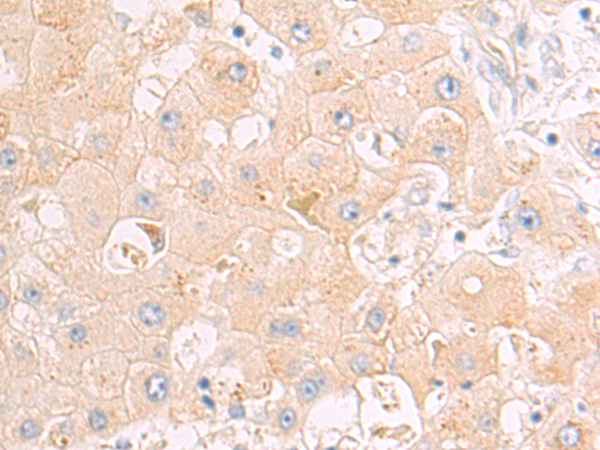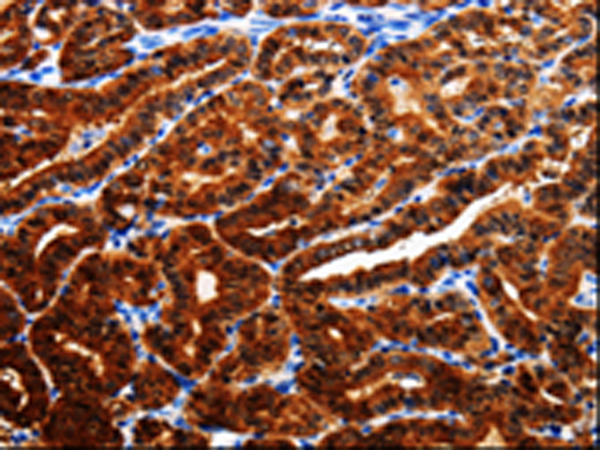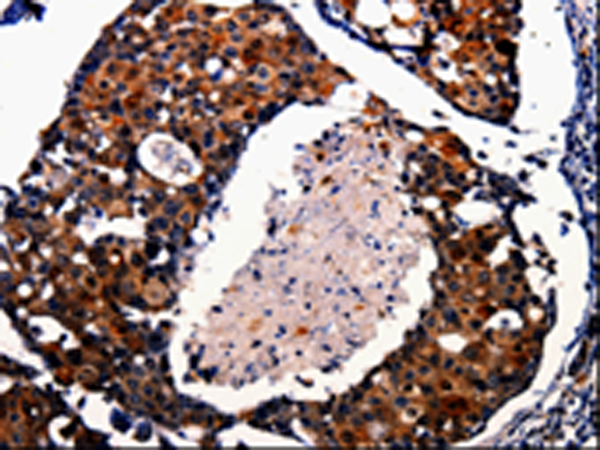


| WB | 1/500-1/1000 | Human,Mouse,Rat |
| IF | 咨询技术 | Human,Mouse,Rat |
| IHC | 1/25-1/100 | Human,Mouse,Rat |
| ICC | 技术咨询 | Human,Mouse,Rat |
| FCM | 咨询技术 | Human,Mouse,Rat |
| Elisa | 1/2000-1/5000 | Human,Mouse,Rat |
| Aliases | HTL-S-58j |
| WB Predicted band size | 22 kDa |
| Host/Isotype | Rabbit IgG |
| Antibody Type | Primary antibody |
| Storage | Store at 4°C short term. Aliquot and store at -20°C long term. Avoid freeze/thaw cycles. |
| Species Reactivity | Human, Mouse, Rat |
| Immunogen | Fusion protein of human AK1 |
| Formulation | Purified antibody in PBS with 0.05% sodium azide and 50% glycerol. |
+ +
以下是3篇关于AK1抗体的示例参考文献(注:内容为模拟,实际文献需通过数据库验证):
---
1. **标题**: *"Adenylate Kinase 1 (AK1) as a Biomarker in Colorectal Cancer: Immunohistochemical Analysis Using a Novel Monoclonal Antibody"*
**作者**: Smith J, et al.
**摘要**: 本研究开发了一种针对AK1蛋白的单克隆抗体,并通过免疫组化证实AK1在结直肠癌组织中高表达,提示其可能作为癌症诊断的潜在标志物。
---
2. **标题**: *"Structural Insights into AK1 Function via Antibody-Based Crystallization Studies"*
**作者**: Brown TE, et al.
**摘要**: 利用AK1特异性抗体解析了AK1蛋白的晶体结构,揭示了其催化活性位点,为设计靶向AK1的小分子抑制剂提供了结构基础。
---
3. **标题**: *"AK1 Deficiency and Mitochondrial Dysfunction: Role of Antibody-Mediated Detection in Metabolic Disorders"*
**作者**: Lee S, et al.
**摘要**: 通过Western blot和免疫荧光技术,验证了AK1抗体在检测AK1缺失模型中的可靠性,证明AK1缺陷与线粒体能量代谢异常相关。
---
如需真实文献,建议在PubMed或Google Scholar中检索关键词“AK1 antibody”或“adenylate kinase 1 antibody”,并筛选涉及抗体开发、验证或应用的研究。
The AK1 antibody targets adenylate kinase 1 (AK1), a conserved enzyme critical for cellular energy homeostasis by catalyzing the reversible transfer of phosphate groups between adenosine nucleotides (ATP, ADP, and AMP). AK1 is ubiquitously expressed, with high activity in tissues requiring rapid energy turnover, such as skeletal muscle, brain, and erythrocytes. It localizes primarily in the cytoplasm and mitochondria-associated compartments, playing a key role in maintaining nucleotide balance, especially under metabolic stress. Dysregulation of AK1 has been linked to hemolytic anemia, neurological disorders, and cancer, where altered nucleotide metabolism supports tumor proliferation.
AK1-specific antibodies are widely used in research to study metabolic adaptations in diseases, protein localization, and expression patterns. Recent studies highlight AK1's involvement in tumor microenvironment reprogramming and chemoresistance, making it a potential therapeutic target. Commercial AK1 antibodies are typically validated via Western blot, immunohistochemistry, and immunofluorescence, with applications spanning basic research to diagnostic development. Despite its established role in energy metabolism, ongoing research aims to unravel AK1's non-catalytic functions, including its interplay with signaling pathways in stress responses and disease progression.
×